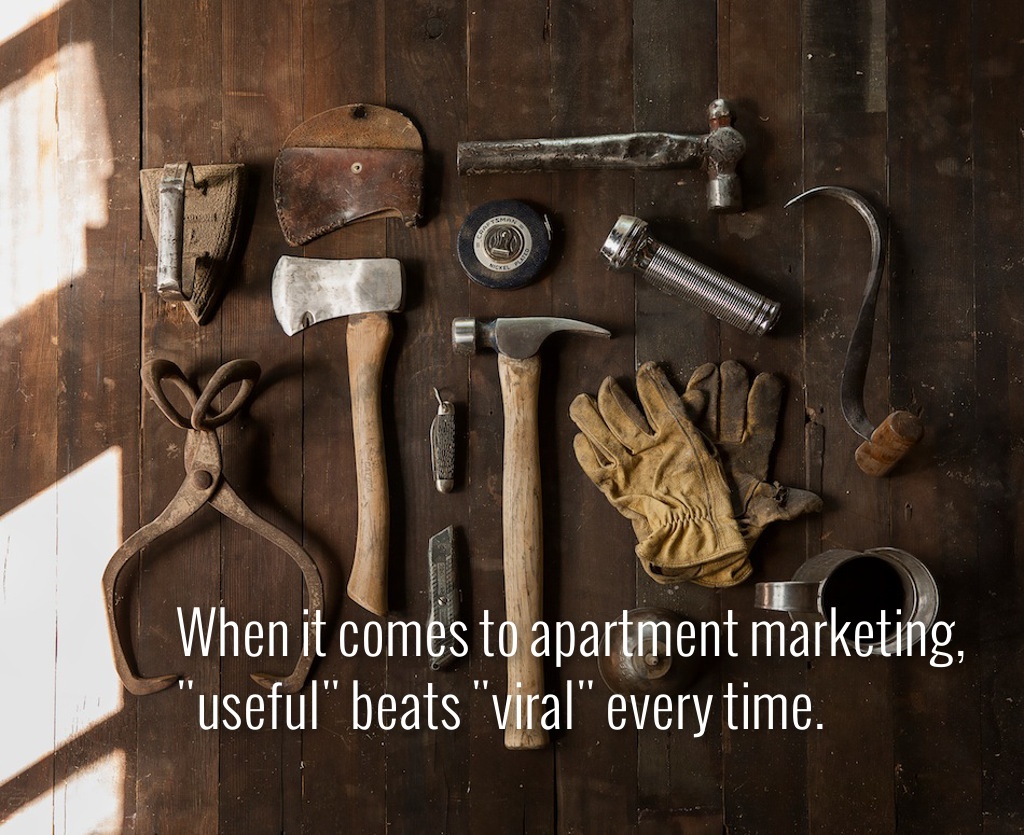Multifamily Blogs
Why "Boring" Apartment Marketing Content Generates Leases
Why "Boring" Apartment Marketing Content Generates Leases

Click-bait media site Upworthy was founded in March of 2012. By November of 2013, the site had 18 million users per month. Political news and analysis site Vox.com was founded in April 2014. By September of that year, the site was already averaging around 11 million unique users per month.
Stories like that have become the stuff of legend with online marketers. Talk of virality and growth hacking dominate discussions of online marketing to the degree that everyone, even people in industries will virality may not make as much sense, want to be the next Upworthy.
Virality doesn't always make sense.
It's notable that both Upworthy and Vox.com are media companies. They produce and distribute written content and their business model depends on generating pageviews and building a consistent readership. They rely on advertising for their money and advertisers won't pony up unless they can deliver a big audience. So for these companies, you want virality because virality equals readers which equals advertising revenue. (It also means that you can get advertisers competing for space on your site, which means larger amounts of advertising revenue.)
What should non-media companies aspire to online?
Obviously you want to get traffic to your site. When we say "don't aim for virality" we're not saying "ignore traffic." Rather, we're saying approach your traffic strategy intelligently. Viral traffic is notoriously fickle and seldom converts into something more than a visitor--which if all you need is web visitors is fine, but if you're a non-media business then you're chasing something more. You want them to download your eBook or call your office or come to your store. And viral visitors typically won't do that.
So what should your alternative strategy be? Think about it this way:
- Viral content spreads to a huge group of people because it is amusing or informative, but it seldom moves people to take further action.
- Useful content spreads to a smaller group of people, but the people who find it use it to solve a problem, which motivates them to take further action and learn more about your business.
To take a non-multifamily example, a friend of mine is working on an eBook teaching people in a certain industry how to create quality websites. His particular niche is filled with awful websites, terrible design, and boring content. So he is creating an eBook that is going to give people a step-by-step guide to creating a good website to promote their work.
Will this project go viral? No. Is it even actually all that entertaining? No. It's going to be a fairly technical, step-by-step guide to building a website for a certain small niche.
But will it be easy for the right people to find it via Google and will it get shared amongst his intended audience? It should. And if members of that audience come to his site, download the eBook, and then use what he teaches them to create a great website, will they be interested in other things he does? Yes. He's helped them solve a significant problem and now they trust him, are interested in what he's doing, etc.
"Boring" apartment marketing content gets you leases.
This is why we say that "boring" apartment marketing content, like a straightforward video tour of a floorplan or comprehensive photos of an apartment, will generate leases for your community. Think about the typical apartment shopper. What problem do they have? They don't need more viral content to look at--they already know about Upworthy and probably other sites like Viral Nova, 22 Words, and College Humor.
Their problem is they are trying to find a place to live. They need to be able to find a few different apartments, compare them, and make a decision. So what can you do to solve that problem? You can make it as easy as possible for them to find out about your community. This is where that "boring" content comes in. A walkthrough video tour of your two bedroom floorplan doesn't sound like something that would be super popular, but to apartment shoppers it is incredibly valuable because it allows them to see into an apartment and know exactly what it's like. It's not popular, in other words, but it solves a problem for your intended audience. And in multifamily that's the best thing your marketing can do for prospective residents.
Conclusion
Unless you have some way of directly monitizing your pageview numbers, virality is going to be of only ancillary benefit to your business. For you, the money is elsewhere and comes from getting your website visitors to do something specific like calling your leasing office. So you need to create content that may not be as shareable as that Buzzfeed quiz or Upworthy video, but that provides a real benefit to your prospective residents by helping them solve a specific problem related to your specific business. It might be "boring" to some, but it won't be to your prospects. To them, it's a welcome, useful help that can only help your community.

